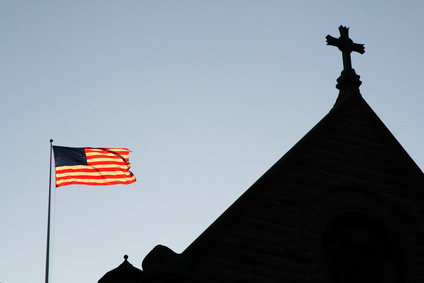Episcopalians are descendants of a state-church tradition living in a country founded on national disestablishment. But ever since a Tory former British-army chaplain was made a bishop by Scottish non-jurists to serve an American church, we have struggled with the relationship between church and state.
Now a significant number of Americans appear to believe that Christianity should be our national religion. Maybe they think that will be like having a state bird or a state song…but probably not.
Elizabeth Stoker Bruenig, writing in The New Republic, talks about why the wish for a nationalized faith, as politically unlikely as it may seem, is bad for Christianity.
This is already true of right wing rhetoric wherein Christianity is made to stand in for American conflicts or situations. Earlier this month, for example, President Barack Obama faced censorious outcry after noting that Christians of the past carried out the Crusades; with Republicans like Governor Bobby Jindal accusing the president of going hard on Christianity in lieu of ISIS, it’s clear the Crusades were, in this instance, turned into an analogy of a purely modern conflict, with Obama implied to be on the wrong side. By criticizing Christianity instead of Islam he was understood to take the side of foreigners rather than Americans.
With Christianity serving so often as a cheap byword for Americanism, it’s no surprise that 54 percent of Republicans believe the president is an undercover Muslim, and that a handful of their vocal politicians believe he does not love America. These are twin suspicions, both impossible to prove, both based on speculation about the president’s internal states, which trade evidence among them, such as the fact that Obama will not say that America is at war with Islam.
Were Christianity named our national religion, it would only be dubbed such to serve a particular national purpose, that is, to straighten out our morals or boost morale for our confrontation of terrorism abroad. But to do this would be to force Christianity into the servitude of particular national interests, which would only further the degree to which the Christian faith is already wrongly conflated with specific American political aims. But the goals of Christianity are in no sense specifically American, and understanding them as such only instills divisiveness between American and global Christianity—and that’s ultimately contrary to the unity sought by the Christians of the world. In other words, establishing Christianity as a national faith would force Christianity into submission to American politics, morphing it into a servant rather than a guide of political thought.
Posted by Andrew Gerns

